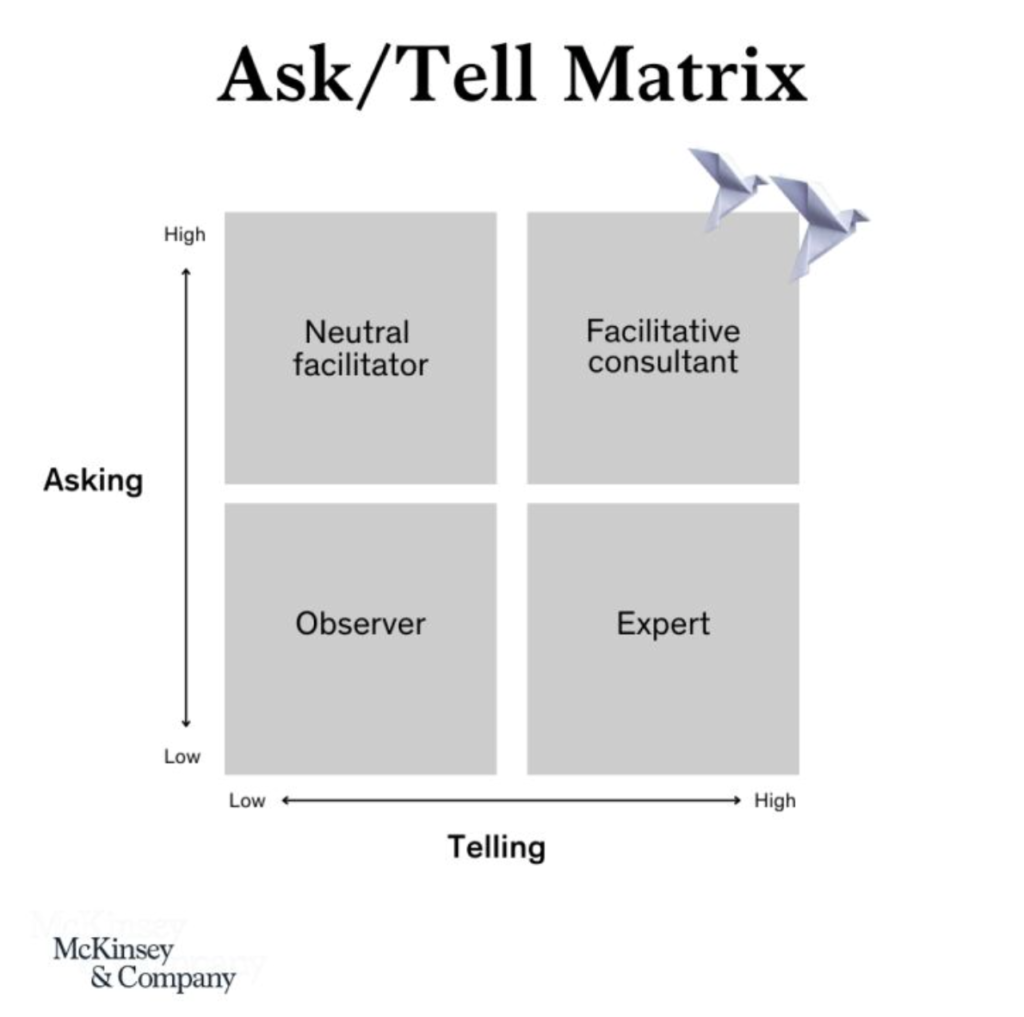At first sight, consulting work can appear to be vague, undecided and to some even a little bit bullshit. That’s unfortunate and at the same time understandable, given how broad the field can be and how modern life gives us so many stories of out-of-touch consulting that fails to deliver results.
Part of the problem, of course, is that the profession can be so hard to pin down (especially for a non-consultant outsider).
When a single precise definition is missing, I’ve found that a comparative approach to be useful.
The Ask/Tell Matrix
There are many types of consultants doing different things, but generally speaking you can divide them in four quadrants.

Observers are not Consultants
To witness a situation and attentively observe its dynamics can be useful but does not constitute consulting. It is too passive to incur change. Can be valuable to assess context, but that’s it. Real consulting needs a more active stance, either in probing or in directing.
To ask is a verb
Experts become so because they accumulate experience in their domains of competence. This experience allows them to gather and recognize patterns. A seasoned consultant can arrive at a new client and quickly notice details that tell a story. Uncovering these patterns is valuable work and some consultants make their careers in these way. Their insight, coupled with their ability to steer a client’s attention towards the most relevant aspects of their situation allows them to be Facilitators. Depending on how much their explicitly tell their clients what to do, they might be either Neutral Facilitators (somewhat akin to a therapist) or Facilitative Consultants (closer to a performance coach).
Directing clients with one’s expertise
A good example of this is a niche lawyer that knows exactly how to navigate a specific type of case. An accountant that specializes in setting up complex business entities for tax efficiency is also here. As is a sport’s surgeon focused on knee replacements. Client’s will need to trust them fully and follow their time-proven strategies. At the lower-right corner of the 2X2 matrix, the expert directs the action. They ask little because there’s not a lot of uncertainty on how to address the issue at hand. If an Expert includes probing, questioning and investigating tools to her utility belt, they might move up to the top-right quadrant and be a Facilitative Consultant.
Going deeper on what is a Facilitative Consultant
Experts shine where there’s little uncertainty on what needs to be done. There might be dilemas, but Experts have the pattern recognition skills to come to useful decisions at these crossroads.
Facilitators are better equipped to deal with undefined problems, unclear context and conflicting options. Their skills are closer to enquiry and investigation, with a bit of consensus building on the side.
When an Expert and a Facilitator merge, what we get is a technically impressive person, capable of wrangling known problems and also an astute navigator of undiscovered territories, very comfortable with exploring different avenues and solutions.
These people are rare. It can take decades to accumulate technical chops to become an expert. At the same time, very good facilitators tend to be strong generalists, capable of operating in new fields and getting the 80/20 of it rather quickly. A professional that invested the time to excel at both is uncommon and yet, extremely capable to deliver change.
These are not fixed
Assuming you have the skills to operate at whatever quadrant, it is useful to remember these are roles and not titles. As such, you can participate in a project where you’re expected to act as an expert and letter join a team where you’re paid to facilitate. The main point here is that as a lens, this 2×2 is useful (especially in thinking what you are not) but not absolute gospel for the entirety of your career.
If you are currently an Expert, looking to add some facilitation skills to your toolbox I’d love to help you do that. In the box below, you can find a link to schedule a free call with me where we’ll go over different approaches for this.